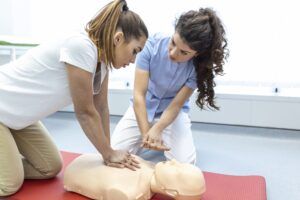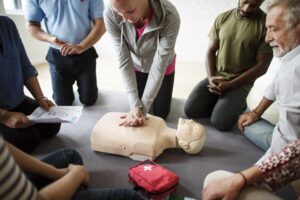Typically, your first aid certificate stays valid for three years, with CPR skills needing a refresher every year. Think of it like your driver’s license; you need to renew it regularly to make sure you’re up to date and safe on the road.
Similarly, keeping your first aid skills current ensures you’re confident and ready when an emergency strikes. Requirements can vary depending on your workplace or state (for example, first aid training in NSW may have specific guidelines), so it’s important to check before your certificate needs renewing.
In this guide, we’ll cover everything from expiry timelines, CPR renewals, ARC recommendations, workplace compliance rules, and even how to check your certificate online.
You Make Also Like – How to apply for a security guard
Table of Contents
ToggleWhat is First Aid Training?
First aid training teaches you how to help someone quickly if they’re hurt or suddenly sick, before doctors arrive. You’ll learn basics like CPR and what to do for cuts, burns, or choking.
A first aid certification (for example, the HLTAID011 Provide First Aid course) formally recognises that you’ve completed accredited training and demonstrated competency in essential lifesaving skills.
Why does expiry matter? Because:
- Emergency response guidelines evolve (e.g., the Heimlich manoeuvre was once standard, now replaced with back blows and chest thrusts).
- Legal requirements demand renewal to meet Work Health and Safety (WHS) standards.
- Most importantly, your skills naturally fade without practice.
Think of it like a gym membership: having one doesn’t mean you’re fit unless you keep training.
Quick Answer: First Aid & CPR Renewal at a Glance
If you’re short on time, here’s the simple breakdown:
- Providing First Aid (HLTAID011) is valid for 3 years, and you’ll need to refresh the full course once every three years.
- CPR (HLTAID009/001) is valid for 12 months, which means you should renew it every year to stay compliant and confident in your skills.
- Workplace compliance varies depending on your role and industry, but all employees must follow the WHS Code of Practice.
For more details and course options, check out MultiSec Training’s First Aid Courses.
Why Certificates Expire
Technically, first aid certificates don’t expire, but workplaces, insurers, and regulators treat them as expired once they’re past recommended renewal dates.
Here’s why:
1. Legal Compliance
- Safe Work Australia requires employers to ensure staff have up-to-date training.
Many industries (childcare, construction, and aged care) have stricter rules for insurance and compliance.
2. Skill Retention
- Studies show that CPR skills, like correct compression depth and rate—decline within 6 to 12 months.
- Without practice, most people struggle to recall the sequence of DRSABCD (Danger, Response, Send for help, Airway, Breathing, CPR, Defibrillation).
3. Updated Medical Guidelines
- ARC regularly updates its protocols. For example, in 2024, emphasis was added on early use of AEDs in public spaces and updates to choking management.
In short, even if your certificate is still technically valid, your skills might not be, which is why staying aware of your first aid certificate expiry is essential.
CPR Renewal: Why It’s Annual
Unlike general first aid, CPR renewal is required every 12 months. Why?
- Muscle memory fades fast – Within 6 months, many people forget the correct compression depth (5–6cm in adults) and rate (100–120 per minute).
- Changing techniques – Guidelines evolve as new medical evidence emerges.
- High stakes – CPR is the most time-critical skill. Getting it wrong can mean the difference between life and death.
A 2022 ARC study found that less than 40% of participants could perform effective CPR one year after initial training without a refresher, showing exactly how long is CPR valid for in real practice.
How to Check Your First Aid Certificate Validity
Not sure when does first aid expire or how to find my first aid certificate? Here’s how to check:
- Physical Certificate – Look for the “date of issue” and “recommended renewal date” printed on your card or paper certificate.
- Digital Certificates – Most training providers now issue QR-coded certificates you can verify instantly online.
- Employer Records – Many workplaces track training renewals in logbooks or HR software. Ask your HR/WH&S officer.
Lost your certificate? Contact your training provider; they can reissue digital records.
Workplace vs Personal Training Requirements
1. Workplace Requirements
- Under the WHS Code of Practice, employers must ensure staff renew training at required intervals.
- Example: Childcare workers must update CPR annually under ACECQA rules.
2. Personal Training
- Legally, there’s no requirement to renew if you only trained for personal knowledge.
- However, best practice recommends refreshing CPR every year and first aid every 3 years, regardless of the validity period for first aid. Refreshed knowledge saves lives.
Real-life example: A parent at a sports game might never face compliance checks, but if they’ve refreshed their skills, they’re far more prepared if a child collapses on the field.
What Happens If You Let It Expire
If your certificate lapses, here’s what can happen:
- Workplace: You may be removed from duty until retraining. Employers risk fines for non-compliance.
- Insurance: Some industries lose liability cover if staff training isn’t current.
- Personal Risk: Outdated responses can make emergencies worse, like using old choking techniques.
First Aid Refresher Courses: What to Expect
Refresher training isn’t just “ticking the box.” It reinforces vital skills like:
- DRSABCD action plan
- CPR and AED practice
- Choking response (back blows/chest thrusts)
- Severe bleeding and wounds
- Burns, bites, stings, poisoning
- Medical conditions (asthma, anaphylaxis, diabetes, seizures)
New learning formats:
- Blended learning: theory online + 1-day practical.
- VR/AR training: immersive scenarios to test your response in real time.
How Often Should CPR Skills Be Refreshed?
Even between formal renewals, you can keep skills sharp:
- Practice CPR on a home mannequin.
- Attend free Red Cross or community refresher sessions.
- Watch updated ARC/Resus Council videos.
ARC recommendation:
- Refresh CPR annually.
- Refresh full first aid every 3 years.
Global Perspective
How does Australia compare internationally?
- UK: First aid at work certificates valid for 3 years; CPR annual refresh recommended.
- US: American Heart Association CPR cards are valid for 2 years.
- Canada: Workplace first aid is generally valid for 3 years; CPR is typically 1–2 years.
This shows Australia’s annual CPR renewal is among the strictest, because evidence shows how fast skills decline.
You Make Also Like – How to apply for a security guard
Final Word
So, how long does a first aid certificate last?
- First Aid (HLTAID011): 3 years
- CPR (HLTAID009/001): 12 months
Keeping your skills fresh isn’t just about compliance; it’s about saving lives when every second counts.
Ready to renew? Explore accredited First Aid Courses at MultiSec Training today.
Frequently asked questions
Check your training provider’s student portal or email. Many issues QR-coded certificates.
Yes, you can renew HLTAID009 CPR separately if your general first aid is still valid.
Yes, for Australian workplaces. You’ll likely need to retrain with an RTO to meet WHS standards.
A mix of online theory and practical sessions. You’ll learn DRSABCD, CPR, wound management, choking, AED use, and more.





